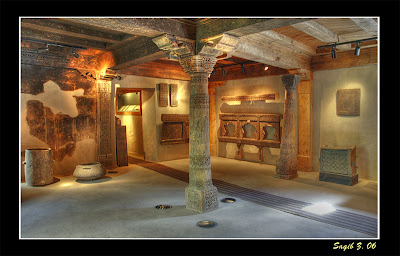KARACHI (APP) - The Ali Gohar House, a 400-year-old architectural masterpiece, formerly used by Hunza’s envoy to Kashgar, was announced as one of the winners to receive the Award for Distinction in UNESCO Asia Pacific Award 2009.
An announcement in this regard here on Thursday said that Ali Gohar House, a project restored by Aga Khan Cultural Service, Pakistan (AKCS-P), was selected from 52 international entries by a panel of international conservation experts in architecture, urban planning, heritage conservation and landscape design.
It said that the award for 2009, received entries from 14 countries in the region, including Australia, China, India, Korea, Vietnam, New Zealand and Thailand.
Being involved in the rehabilitation of Ganish settlements since 1998, the Aga Khan Cultural Service, Pakistan on the request of the Ganish Khun Heritage Care and Social Welfare Society (GKHC & SWS), initiated the physical conservation of the House in 2004.
Reusability being the core component for restoration, the Ali Gohar House was intended to be used as a community centre, providing working space to the Ganish society, encouraging women to congregate and work, and to be a centre for arts, crafts and documentation of Ganish culture. This was planned in consultation with the community and the House has now been leased by the owner to the community, setting a strong example of Community Based Management System.
During the restoration, AKCS-P ensured minimising the appearance and unseen presence of all modern elements.
The insertions needed for the adaptive re-use were designed in such a way, that it permits, if necessary, their removal or alteration in future without damaging the adjacent original fabric.
Minor modern materials such as the addition of basic electric and plumbing services were part of the new material incorporated in the historic building’s fabric.
All such insertion were undertaken to retain authenticity and integrity of the original House. During the whole process, three missing historic wooden stairs were replaced by new ones to meet modern safety standards, whereas the rest of the House remains in its original form.
Working under the Aga Khan Development Network’s Historic Cities Programmes, AKCS-P, has been promoting community-based conservation in the Karakoram region of Hunza and Baltistan, including preservation of architectural heritage and environmental assets.
The 700-year-old Baltit Fort, 1100 years old Altit Fort, the splendid Shigar Fort and the Khaplu Palace are some of the projects which have been or are currently being restored by AKCS-P in Gilgit-Baltistan.
These restored projects act as engines of growth in social, physical, economic and institutional processes hat ensure tangible local benefits and ownership, while strengthening confidence, pride and cultural identity.
AKCS(P) draws upon the strengths of other AKDN agencies in provision of an integrated area development programme around these restored landmarks, which has led to the rehabilitation and revitalisation of historic settlements of Karimabad, Ganish, Chumerkhun and Altit in Hunza; Hunduli, Chinpa, Halpapa, Khlingrong in Baltistan; Hoper in Nagar; and Lone and Arkari in Chitral.
AKCS-P has received a total of 13 international awards till date of which the top six include the two UNESCO Awards of Excellence in 2004 for restoration of Baltit Fort and in 2006 for restoration of the Shigar Fort, the Pacific Asia Travellers Association (PATA) Golden Globe Award for Baltit Fort in 1996, Globe Award for Heritage in 2006 for Shigar Fort, the British Airways Tourism for Tomorrow Award in 2000 for Baltit Fort and the Virgin Responsible Tourism Award for Shigar Fort in 2008.
Till date, the UNESCO Asia-Pacific Heritage award has received 311 entries from 23 territories, spanning a wide range of conservation projects from private residences to palace complexes. Many of the entries have set technical and social benchmarks for conservation in the region, while acting as catalysts for local preservation activity.
The award distribution ceremony is expected to take place in the first quarter of 2010 at Ganish, Hunza, and will be attended by the representatives of UNESCO, Ministry of Culture and Tourism, community and members from diplomatic corps.
About Shigar
Shigar Fort Residence has been open since June 1, 2005, following an intensive six-year restoration undertaken by Aga Khan Cultural Service Pakistan. Originally known as Fong-Khar, which in the local Balti language means "Palace on the Rock", this 400-year old Raja fort-palace has been brought back to life following a careful strategy of adaptive re-use and restoration. The result is a combination of authentic original 17th century architecture together with the modern amenities and services of a luxury guest house.
Shigar Fort Residence has emerged as a new form of cultural tourism in Pakistan that combines guest rooms, facilities, and services of an international standard with an intimate first-hand experience of the unique architectural, cultural, and natural heritage of the Shigar Valley.
 Shigar Fort Residence is located in the beautiful province of Baltistan in the Northern Areas of Pakistan. Its picturesque setting in the Shigar Valley provides the ideal gateway from which to explore some of the most spectacular scenery in the world. Here, the magnificent Karakoram and Himalayan ranges meet - an intersection which results in the most extensively glaciated high mountain terrain on the planet. This includes seven of the world's 25 highest peaks, four of which exceed 8000m, including K-2, the second highest mountain peak in the world at 8611m.
Shigar Fort Residence is located in the beautiful province of Baltistan in the Northern Areas of Pakistan. Its picturesque setting in the Shigar Valley provides the ideal gateway from which to explore some of the most spectacular scenery in the world. Here, the magnificent Karakoram and Himalayan ranges meet - an intersection which results in the most extensively glaciated high mountain terrain on the planet. This includes seven of the world's 25 highest peaks, four of which exceed 8000m, including K-2, the second highest mountain peak in the world at 8611m.
 Baltistan is home to approximately 400,000 people, whose history and culture stretches back to early Tibetan Buddhist origins. This heritage is still evident in much of the local traditions, architecture and language of the area, offering visitors a rich cultural experience unique in Pakistan.
Baltistan is home to approximately 400,000 people, whose history and culture stretches back to early Tibetan Buddhist origins. This heritage is still evident in much of the local traditions, architecture and language of the area, offering visitors a rich cultural experience unique in Pakistan.


No comments:
Post a Comment